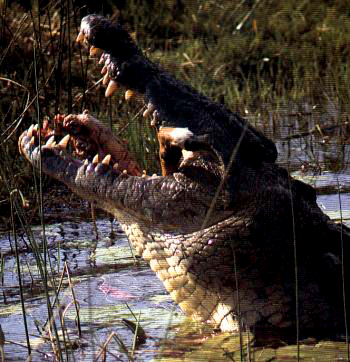Eating

Crocodylians hunt many things and most crocodylians (with the exception of Gavialis gangeticus) are generalists who don't mind what they eat. One will learn about individual diet as one visits the different species. This page just gives the basics.
Crocodylians have some of the strongest jaws in the animal kingdom. An American Alligator (A.mississippiensis)is capable of generating 3000 pounds of pressure per square inch (Erickson et al. 2003). Crocodiles are able to bite straight through bone and turtle shell. The teeth in crocodylians are designed for stabbing and grabbing. They aren't serrated for slicing like in Komodo monitors, but instead are long and conical. Sometimes the teeth are recurved to get a better grip on the prey. These teeth are great for catching prey, but are not so great for ripping out chunks of flesh, or for chewing. So crocodylians had to figure out a way around this. When a crocodylian, say the Nile crocodile in the above picture, kills a large animal like a water buffalo, it will then proceed to grab a piece of that animal (say a limb) and then begin vigorously shaking and jerking its neck until the piece of flesh falls off. Now this is good for relatively small pieces, but water buffalo are huge animals so the croc must find another way to remove a piece of it. The animal solves this problem by a little technique known as the Death Roll.
The death roll is basically this: The crocodile grabs hold of a certain bodypart and then rotates its entire body in the water, doing a 360° turn which then severes that piece of meat. This is a very effective technique and crocodylians have it down to an art, with some animals able to make many, many consecutive roles for one piece. Apparently these guys don't get dizzy easily :)So the croc now has the bite size chunk and all it has to do is swallow it. But crocodylians, like their cousins the birds, have no swallowing mechanisms in their throat. They must rely on gravity to get the food down their gullets. This makes a crocodylian swallowing a large chunk of meat look alot like a big scaly bird.
